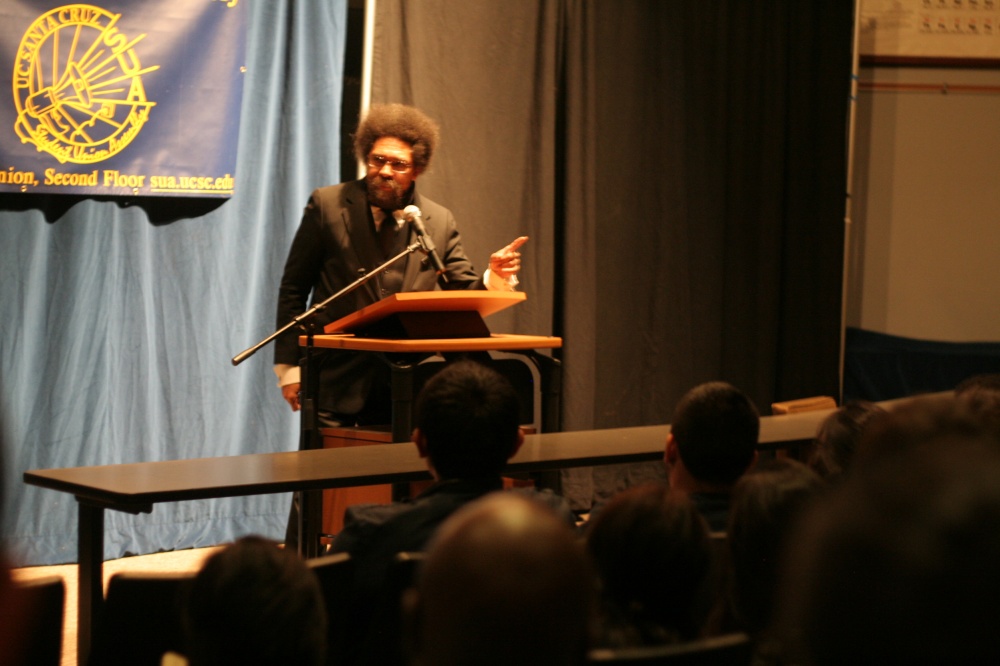
The atmosphere inside Classroom Unit 2 was tense.
Opening remarks had been made at UC Santa Cruz’s Speaker Blowout, and the stage was set for the main attraction of the evening: Dr. Cornel West.
Suddenly, a hush fell over the room and the side door on stage right opened. In strolled West, and up shot the audience. Approximately 400 people were on their feet, clapping and cheering with the same enthusiasm college students usually reserve for movie stars and rappers.
But West is a different kind of celebrity. Holding degrees from both Harvard and Princeton, West is an internationally known philosopher, author, orator and civil rights activist. He is best known for his work in social justice related to race, gender and class in American society.
Speaker Blowout is an annual event that aims to provide a space for students to be educated and informed about issues directly affecting access to institutions of higher learning.
Taking the podium, West began his speech with a question.
“The most important question we can ask ourselves is, ‘What does it mean to be human?’”
This kind of Socratic questioning was a frequent theme in West’s speech. Touching on issues of race, class, the legacy of white supremacy, gender and modern politics, West’s speech highlight- ed the progress that still needs to be made for social justice in America, and the importance of critical inquiry.
“We must come to terms with all forms of suffering,” West said. He urged the audience not to be satisfied with the status quo, and to remove themselves from the pursuit of material happiness. “Become misfits maladjusted to the indifference of the main-
stream,” West said. “From ‘bling bling’ to ‘let freedom ring.’”
West drew upon elements of African American culture in his discourse about social justice, referring to himself as “a blues- man in the life of the mind” and to the true nature of human existence, complete with its beauty and atrocities, as “the funk.” West called those who work for social justice “participants in the funk.”
Before beginning his speech, West acknowledged SUA chair Tiffany Loftin in front of the crowd, calling her “the visionary leader.” Loftin, along with Engaging Education (E2) program coordinators Kalwis Lo and Sahira Barajas, were the driving forces behind booking West. Loftin
said securing such a high-profile speaker was not an easy task.
“There were a lot of hurdles we had to jump over,” Loftin said. “But it was something I had my heart set on.”
Loftin said the main obstacle to bringing West to UCSC was money. The total cost for the event was $30,000, and the SUA and E2 had to fundraise over half the cost after donating $12,000 out of their own operating budgets. E2 program coordinator Kalwis Lo described the trio’s fundraising strategy.
“We wrote a letter to every administrator and college provost, telling them about our event and what our intentions were,” Lo said.
While some people Lo, Barajas and Loftin reached out to did not provide financial support, others
offered use of facilities or moral support. Colleges Nine and Ten provost Helen Shapiro was one of the event’s biggest financial supporters, donating a total of $2,000.
“I think Cornel West is an important voice, and the timing was good given [issues with graffiti] that have happened on campus,” Shapiro said.
Lo said their selection of West was partly in response to the rash of discriminatory graffiti been found on UCSC’s campus this year. The organizers of Speaker Blowout were hoping to use West’s prestige as a professor of African American studies at Princeton to further the movement for the creation of an ethnic studies program at UCSC, Lo said.
West emphasized that no matter what major, issues of social justice affect all students.
“Everything is at stake,” West said. “This has to do with what type of person you want to be, what type of society you want to have, what type of university you want to have.”
In closing, West encouraged all those who work for social justice to retain hope.
“Blues is about hope because the evidence always looks overwhelmingly bad,” West said. “But when you are a participant in the funk, all you’re looking for is movement.”

